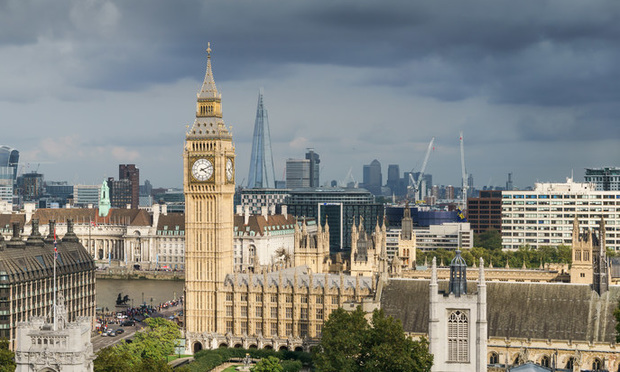Relaxing UK Competition Laws is a Mistake
The UK's emergency support measures will make it easy for large corporations to place their own interests above those of their consumers, says an economic consultant.
May 14, 2020 at 02:02 AM
5 minute read
 Houses of Parliament (Photo credit: Wikimedia Commons)
Houses of Parliament (Photo credit: Wikimedia Commons)
News that competition laws are being relaxed in certain industries to help businesses survive the pandemic has been greeted with enthusiasm by some, seen as a positive step not just for suppliers of goods and services, but serving the interests of consumers too.
On 30 March an Order came into force exempting agreements between suppliers and logistics companies for certain types of groceries and medical products from Chapter 1 of the Competition Act (which bans agreements between two or more businesses that have the effect of preventing, restricting or distorting competition).
In more usual times of course, market collusion is seen as a negative, associated with price-fixing and cartels and so forth. After all, fair markets are predicated on the principle that consumers are best served when the businesses selling to them have to compete with against one another, keeping prices keen.
Yet as we are in unprecedented times, the relaxation of these free market prohibitions is being looked at by some as a good solution to dealing with the difficult supply chain challenges we are facing. But the issue is that over the long term market interference is never good.
The move by competition regulators to relax competition laws was prompted by the need to lessen the financial impact of the Coronavirus crisis on consumers. The Competition and Markets Authority (CMA) set up a dedicated Covid-19 taskforce on 20 March amid concerns business might seek to take advantage of desperate consumers, ie charging extortionate prices for essential items.
On the 25th of that month the CMA announced its changed position on the subject of 'business cooperation' in response to the crisis, saying that some businesses would need to cooperate with rivals to ensure a good supply chain of important items and keep services going for consumers.
It announced that it would not take enforcement action for business collusion where: it was necessary to deal with critical issues arising directly from the Coronavirus crisis and to avoid shortages and to main security of supply; consumers would benefit and/or it is clearly in the public interest; and as long as that the behaviour lasted only as long as necessary to deal with the crisis-related issues.
However this relaxation of competition laws is only one of a number of ways in which we are seeing free market competition being distorted. Less direct, but having an equally disruptive and negative impact on the markets, is the way that the UK Government's emergency support funds and loans are being meted out. These will have a permanent impact on the shape of the UK economy and its competitivity against other major economies for years to come on a scale that is hard to imagine.
Given the UK economy is almost equally split between large corporations and small-to-medium enterprises, it is surprising the financial support to both halves of the British economy is not the same.
The UK government and the Bank of England are offering far more to large corporations, in terms of size and interest costs. For example, the Government's Coronavirus Large Business Interruption Loan Scheme (CLBILS) and the SME equivalent Coronavirus Business Interruption Loan Scheme (CBILS), provide uneven access to emergency funding. Whereas large businesses with existing loan facilities will find relatively easy to obtain new loans under CLBILS, SMEs that have never borrowed money before may find it hard to obtain a response from banks.
Moreover, SME business owners are being required to provide personal guarantees, and interest rates for CBILS loans are set by the banks, at a rate that provides them with a risk-adjusted return on capital in the region of 40%, whereas large companies are able to take advantage of the so-called COVID Corporate Financing Facility (CCFF), which allows large businesses to access the capital markets at artificially low borrowing costs.
By facilitating access to funding for large corporations, the CCFF potentially gives a lifeline to companies weakened and debt-ridden since the last financial crisis, whilst healthy, debt-free SMEs, will find it hard to obtain emergency support at acceptable interest rates. This kind of action amounts to a distortion of free competition and a new rule for the marketplace of 'Survival of the Weakest'. And where corporations that should have defaulted instead survive, the prices they set for goods and services may be higher than in a free market, so bad news for consumers too – and runs counter to the principles of competition law.
The Competition & Markets Authority's Order of 30 March relaxing UK competition laws, and the UK Government's recent emergency support measures for businesses, will make it easier for large corporations to place their own interests above those of their consumers for years to come.
Alberto Thomas is co-founder of Fideres, a provider of economic analysis to law firms and their clients as well as regulators.
This content has been archived. It is available through our partners, LexisNexis® and Bloomberg Law.
To view this content, please continue to their sites.
Not a Lexis Subscriber?
Subscribe Now
Not a Bloomberg Law Subscriber?
Subscribe Now
NOT FOR REPRINT
© 2025 ALM Global, LLC, All Rights Reserved. Request academic re-use from www.copyright.com. All other uses, submit a request to [email protected]. For more information visit Asset & Logo Licensing.
You Might Like
View All
Pallas Partners Founder On the Disputes Trends to Look Out For in 2025
4 minute read
What to Expect From Teresa Ribera, the EU‘s New Competition Commissioner
6 minute read
Trending Stories
- 1Adding 'Credibility' to the Pitch: The Cross-Selling Work After Mergers, Office Openings
- 2Low-Speed Electric Scooters and PIP, Not Perfect Together
- 3Key Updates for Annual Reports on Form 10-K for Public Companies
- 4When Words Matter: Mastering Interpretation in Complex Disputes
- 5People in the News—Jan. 28, 2025—Buchanan Ingersoll, Kleinbard
Who Got The Work
J. Brugh Lower of Gibbons has entered an appearance for industrial equipment supplier Devco Corporation in a pending trademark infringement lawsuit. The suit, accusing the defendant of selling knock-off Graco products, was filed Dec. 18 in New Jersey District Court by Rivkin Radler on behalf of Graco Inc. and Graco Minnesota. The case, assigned to U.S. District Judge Zahid N. Quraishi, is 3:24-cv-11294, Graco Inc. et al v. Devco Corporation.
Who Got The Work
Rebecca Maller-Stein and Kent A. Yalowitz of Arnold & Porter Kaye Scholer have entered their appearances for Hanaco Venture Capital and its executives, Lior Prosor and David Frankel, in a pending securities lawsuit. The action, filed on Dec. 24 in New York Southern District Court by Zell, Aron & Co. on behalf of Goldeneye Advisors, accuses the defendants of negligently and fraudulently managing the plaintiff's $1 million investment. The case, assigned to U.S. District Judge Vernon S. Broderick, is 1:24-cv-09918, Goldeneye Advisors, LLC v. Hanaco Venture Capital, Ltd. et al.
Who Got The Work
Attorneys from A&O Shearman has stepped in as defense counsel for Toronto-Dominion Bank and other defendants in a pending securities class action. The suit, filed Dec. 11 in New York Southern District Court by Bleichmar Fonti & Auld, accuses the defendants of concealing the bank's 'pervasive' deficiencies in regards to its compliance with the Bank Secrecy Act and the quality of its anti-money laundering controls. The case, assigned to U.S. District Judge Arun Subramanian, is 1:24-cv-09445, Gonzalez v. The Toronto-Dominion Bank et al.
Who Got The Work
Crown Castle International, a Pennsylvania company providing shared communications infrastructure, has turned to Luke D. Wolf of Gordon Rees Scully Mansukhani to fend off a pending breach-of-contract lawsuit. The court action, filed Nov. 25 in Michigan Eastern District Court by Hooper Hathaway PC on behalf of The Town Residences LLC, accuses Crown Castle of failing to transfer approximately $30,000 in utility payments from T-Mobile in breach of a roof-top lease and assignment agreement. The case, assigned to U.S. District Judge Susan K. Declercq, is 2:24-cv-13131, The Town Residences LLC v. T-Mobile US, Inc. et al.
Who Got The Work
Wilfred P. Coronato and Daniel M. Schwartz of McCarter & English have stepped in as defense counsel to Electrolux Home Products Inc. in a pending product liability lawsuit. The court action, filed Nov. 26 in New York Eastern District Court by Poulos Lopiccolo PC and Nagel Rice LLP on behalf of David Stern, alleges that the defendant's refrigerators’ drawers and shelving repeatedly break and fall apart within months after purchase. The case, assigned to U.S. District Judge Joan M. Azrack, is 2:24-cv-08204, Stern v. Electrolux Home Products, Inc.
Featured Firms
Law Offices of Gary Martin Hays & Associates, P.C.
(470) 294-1674
Law Offices of Mark E. Salomone
(857) 444-6468
Smith & Hassler
(713) 739-1250









